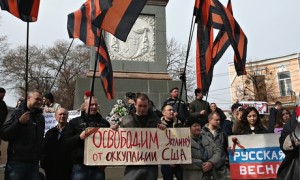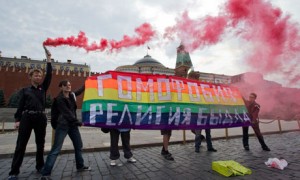A referendum on the status of Crimea, formerly a subdivision of Ukraine, is to be held on this Sunday in which Crimeans will decide whether to join the Russian Federation or set a course for independence.

The move comes after Russian infiltration on the Black Sea peninsula. In seemingly effortless political stagecraft, Russia was able to gain control of Crimea in late February–all without firing a single shot. The crisis began to unfold following the uprisings in Ukraine’s capital of Kiev with the ouster of then pro-Russian president Viktor Yanukovych. With its interests threatened following Yanukovych’s flight, Russia was able to gain considerable political leverage over the new Ukrainian government by sending unidentifiable (no insignia or indication of national origin) soldiers to gradually take over the peninsula of Crimea. According to the Russian government, the intent was to protect the majority of ethnic-speaking Russians in Crimea who, the Kremlin claimed, were under threat from Ukrainian nationalist extremists in the new Ukrainian government.
After Russian soldiers took control of the airports, roads, and other major infrastructures, armed gunmen seized the main Crimean assembly building and presided over the election of Sergei Aksyonov (a high-profile advocate for Crimean unity with Russia) as prime minister of Crimea. Since the election of Aksyonov, the government of Crimea has set referendum for Sunday to decide whether Crimea joins Russia as a federal subject or becomes an independent state. (Additionally, the government voted ahead of the referendum to declare its intentions as independent should voters approve the split from Ukraine.)
A key question surrounding the Crimean referendum is its legality, something that the United States, along with other major world powers, have refused to recognize. In a statement to the press, President Obama claimed that the proposed referendum “would violate the Ukrainian constitution and violate international law,” citing that any discussion on the future of Crimea had to include the “legitimate government of Ukraine.” Said Obama, “In 2014, we are well beyond the days when borders can be redrawn over the heads of democratic leaders.”
Likewise, a statement released from the G7 (a group of developed world powers, including the US) on Wednesday condemned the referendum and said that such a measure “would have no legal effect.” The G7 leaders voiced their concerns over the hastiness of the referendum, as well as “the intimidating presence of Russian troops” which could influence the vote. According to the G7, “In addition to its impact on the unity, sovereignty and territorial integrity of Ukraine, the annexation of Crimea could have grave implications for the legal order that protects the unity and sovereignty of all states.”
The Russian government, however, claims that the referendum is perfectly legal and within the bounds of international law. Citing the case of Kosovo and other international laws, President Vladimir Putin claimed that the Crimean referendum was nothing more than an expression of the right of self-determination. (One wonders, however, if Mr. Putin would feel the same if Chechnya were also presented with this same right.)
In response the crisis in Crimea, a new executive order issued by Obama authorized sanctions and travels bans against those found to be causing or benefiting from the crisis. Worldwide, other countries are following the same measures. In addition to sanctions and other penalties, the United States has also pledged to issue a $1 billion loan package to support Ukraine, while the EU has put together a $15 billion package. Though the US and other international bodies have promised harsher penalities on Russia, exactly what the international response will be following the referendum on Sunday remains to be seen.

